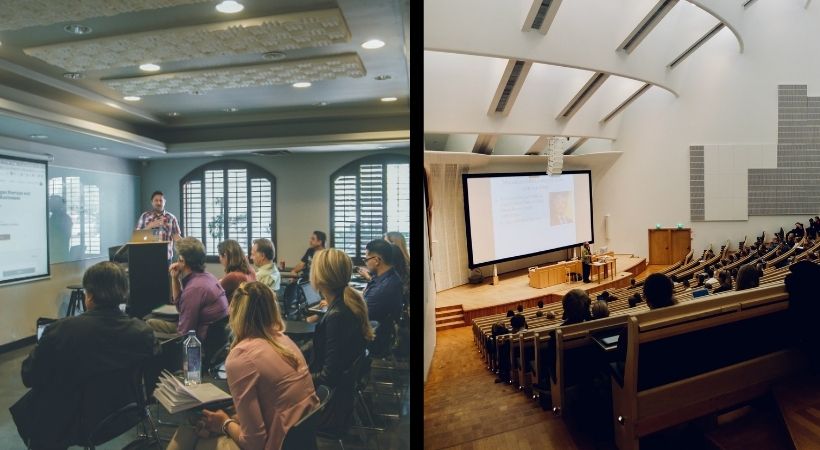Important Factors on Deciding How to Choose a University

Deciding which university is right for you can be challenging. You have probably heard that going to a university is one of the most critical decisions in your life. It is true because it will have a long-lasting impact on your personal and professional lives. We know what you are thinking - So, how do I choose the right school for me? (Please note that university, college and school are used interchangeably and refer to the same thing; an educational institution.)
Before we answer the question, keep in mind that your decision to choose a school should not be hasty; rather, it should be a rational one.There are multiple factors to consider when choosing a university: location, size, safety, cost of attendance, curriculum, transportation, housing, employability, faculty, etc. When choosing a university, you must weigh out the various factors to find one that best suits you and your unique needs.
How to choose a university - The 11 primary factors to consider
1. Finding the right university that aligns with your profile:
When choosing the right university, make sure you don't put all your eggs in the same basket. Diversify your university list based on the following categories:
Dream Schools: These dream schools are usually those universities where the acceptance rate is notoriously low with high competition. Don't let the sticker price of a financial 'reach' school (One that will really stretch your budget.) scare you off! Take your chances and apply! If you get into one of them, then consider yourself lucky. Scholarships may then be able to make it a reality.
Target School: These schools mainly accept students of your profile. If you apply to the target school, you are likely to get in.
Safety School: These are the schools where your academic credentials exceed the schools' usual accepted students' profiles. In most cases, you will get accepted, and if fortunate, you will receive generous scholarships.
2. Location
Location is another essential factor to consider when choosing a university. Ask yourself the following questions:
What is the weather like - warm and sunny or cold and snowy?
Is it in an urban, suburban or rural area? Do you want to live in a large diverse city or one smaller and more 'cosy'?
Is it close to your family, a short distance away or a 'see you in 6 months' away? Do you want to remain at home? How far do you want to be from home? Is it easy to return home?
How close is transportation home(airports, railway stations, etc.)?
3. Cost
Unless you already have a large university savings fund, the cost is probably important to you. Some students look for affluent schools. (The cost of tuition isn't always reflective of quality) Yet, for others, it is essential to pay for college without taking out student loans. Remember to include room and board, tuition, books, transportation and fees, when calculating the total cost of attending school.
Ask yourself these questions:
How much is the tuition fee?
What part will you pay, and how much will your family donate?
How much money for tuition and/or living expenses can you earn?
What else will you have to pay for, e.g., Accommodation, textbooks, lab coats?
Can you get financial assistance, scholarships, grants or bursaries?
Are there co-operatives or paid internships to help pay for school?
Can you work part-time on or off campus? What could you earn (assume you will earn minimum wage)?
4. Opportunity for Scholarships
Some universities are more likely to provide scholarships or financial resources to students than others. If you know you will need help to pay for university, look for schools that provide generous funding/scholarships/lower tuition to needy students.
If you need financial assistance, take a closer look at the types of financial aid packages available to registered students. The school's website can also provide information about the percentage of students receiving financial aid or the average number of students receiving financial aid. Are there other sources for scholarships (Yes, possibly)?
5. Student to Faculty Ratio
The student to faculty ratio is another most critical statistic when it comes to choosing the right university. Let's assume a ratio of 10:1. Such a school has a lower student to faculty ratio. In such a case, you will likely get help from professors for your academics, i.e., you are more likely to receive personalized instructions and suggestions crucial for your academic success.

6. School Size
Even if the ratio of student to faculty is reasonable, analyze the overall size of the school. This can play a significant role in your level of comfort and how well you fit in. A large school may be difficult for some students, but a small school may not 'do it' for others. Do you want to recognize everyone on campus, or do you want to be able to get lost in the crowd?
Large universities often have a lot of resources. This may include college facilities such as student housing, libraries, health facilities, athletic facilities,clubs, culture, and entertainment. Major research universities are also likely to have large budgets for technology, technical classes, research and development labs, engineering, and more fields of study. Perhaps, most importantly, large institutions often offer a wide range of study options, including hundreds of different majors and focuses. This can be very appealing if you have not yet decided on your major or are seeking an education that involves different faculties.
Smaller colleges that have a lot of offerings, you probably can't afford. Many colleges are small enough to focus on general arts education or disciplines within that. The campus and classroom sizes will be small and a general college knowledge is often very close.
Remember, a small and reasonable school can still be found in a big, bustling city. And a large public university can be found in a small town (these are usually party schools). It is important to judge the size of the school in the context of the environment.
The advantage of attending a large university:
There are many opportunities to meet new people.
Prominent colleges usually have a wide selection of study programs. You are more likely able to 'custom build' your major.
There is a vast collection of research materials and research tools.
There will be many clubs and extracurricular activities.
They have well-funded sports programs.
They tend to attract popular and/or progressive ideas.
The disadvantage of attending a large university:
You may end up in large lectures containing hundreds of students, which leads to little help from professors.
There is a lot of red tape handling; if you want to change majors, you may need to get more signatures and approvals than when going to a small college.
If you do not talk about your needs and interests, you may get lost in the crowd. You have to discover your own opportunities.
It is prevalent for students to immerse themselves in TOO many social, and sometimes, academic opportunities.
The advantage of attending a small university:
You may get to know many people and you will see familiar faces, wherever you go.
In small colleges, relationships between students are often solid.
You may get the assistance you require, from the faculty.
Professors, not Teaching Assistants, teach more classes - generally, there is more focus on undergraduate education.
Small colleges often have robust student counselling programs.
You may have more opportunities to gain leadership experience since there will be less competition than in big schools.
The disadvantage of attending a small university:
There are usually only a few research areas and limited resources.
You will find little diversity in the student body and little focus on big sporting events.
There are few choices for your major.
Small colleges can be very fragmented, especially in rural areas.
There won't be a lot of variation in housing choices.
7. Jobs right after graduation
If you are worried about getting a job after graduation, research the percentage of students who get a job right after graduation. Some schools have excellent job placement plans, assisting their students in finding employment after graduation. Schools with a higher placement rate have relevant industry connections and often offer co-ops so that you can familiarize yourself with the qualifications required to succeed in the industry you will be working in. The above is what is referred to as 'employability'.
8. Curriculum
Different schools offer different courses for their programs. Do the courses offered for your degree of choice suit your interests/meet your needs? Is there a co-op program? Are there both course based and thesis based programs?
9. Course Availability
I often see advertisements for schools that offer online, evening and weekend classes. Depending on your availability, you may need to choose a school with those options. Only these types of schools enable those, who have to work full-time, to pursue higher education. Taking classes at night, on weekends, or online is also a great way to earn a degree (e.g., MBA degree program). In addition, if you are an undergraduate student and want to finish your degree early, see if the university you are attending offers summer semester courses.
10. Qualification of Professors
Does the school have highly trained professionals, renowned in their field? To make sure you get the best education, you need to study with highly trained professors who have research experience/published papers and real-world work experience. For example, many professors at, say, the University of California, are highly trained academically (most of them hold Ph.D. degrees in their field), have multiple publications, and work/have worked as consultants in their domain expertise.
11. Department of Education Quality
In addition to investigating professional quality, review departmental quality in your area of study. For example, if you plan to pursue a business degree, find if the university you will be attending has business clubs, industry connections, and even accelerators/incubators for startups. You might also like to grab a unique opportunity to study abroad if your department collaborates with a foreign university. This will give you excellent work experience and help you to see the world from different perspectives. What is the global ranking for the school?
How to choose a University - 5 secondary factors to consider
While you ponder still on what characteristics are important to you when choosing a university, read the following secondary factors.
1. Accreditation
Review school accreditations before you choose your university. Your undergraduate studies may need to be completed at an accredited institution to enter a graduate or professional school. Always choose universities that are government-approved; otherwise, your degree has no value. If possible, look for other international accreditations a university might have, such as ABET (for engineering schools), AACSB (for business schools). Make sure a school is accredited , if necessary, by the governing body of your future profession.These types of international recognitions certainly add value to your degree.
At prestigious universities and colleges, accreditation is almost certainly granted. But with smaller colleges and especially online schools, this is not always the case. Even if an online school is accredited, research the graduate schools and specialist schools of interest to ensure that schools have received accreditation.
2. Social Scene
Let's face it. Some students go to college, attend a lot of parties, yet still hope to get an education for themselves. If attending a school like that is important to you, check out the standards in 'The Princeton Review', which currently lists Ohio University as the largest party school in the US. Arizona State University, the University of Georgia, and the University of Wisconsin in Madison are also serious party schools.
But, parties are only a part of the social scene. Are there group activities, intramural sports, quaint cafes, weekend trips...?
3. Security Statistics and Racism
Safety statistics are an important metric for college life. How well are students protected from crime? How many college police officers are there compared to the number of students enrolled? When you visit a school, do you see evidence of safety on campus? Are there emergency buttoms and cc tv's? Is there sufficient lighting at night?
Another important factor that you must consider when attending your school is racism. Remember, as an international student, you are likely to experience racism at some point. Check to see how many international students usually attend the school. Choose wisely.
4. Out-of-class activities
What describes you? What do you like? Many of your best university memories will occur outside of the classroom, so find out about the range of extra opportunities.
What kind of events can you go to on or near campus?
What clubs, sports and sports clubs are there?
What fitness lessons are available?
Where are the cool places to eat and hang out with friends?
How do you join your university student government?
Can you volunteer in the local community?
Are there places to celebrate your faith on campus or around?
5. Accommodation
Whether you live in your home town/city, travel across the country or travel internationally, your accomodation for university is important. Many students choose to stay home for their first year or two.
Do you want to stay on campus or share a house/apartment off-campus?
What services are provided where you live? Are laundry, wifi, cleaning, security, computer repair, gymnasiums and games available?
Looking for a roommate?
How much does it cost to stay on-campus vs. off-campus?
What does a meal plan cost? Should you buy one? Check on the local cost of living.
How easy is it to find accommodation off-campus campus?
Are there grocery stores and laundry facilities nearby?
A newer concern, brought more to the forefront by the pandemic, is mental health support. Is there any on campus or nearby, at an affordable rate?
Lastly, choosing a university is a paramount decision that has a long-lasting effect on you. This decision should be taken solely by you based on the factors mentioned above. While mentors, friends, and family members can provide important inputs, the ultimate decision must be yours.
Remember that university rankings may provide a good indication about a university but you shouldn’t solely choose a university based on its ranking. There are thousands of universities worldwide that provide excellent education at affordable costs but they aren’t always included in popular rankings. We wish you good luck in the university search process.
Similar Posts
How do you email a professor about funding?
How to Email a Professor About Research Opportunities
Avoid Getting Into A Fake University/College In Canada
How To Get Cheap Flights For Students
How to accomplish what you want - S.M.A.R.T. Goals for Students
Fake Friend? Learn the types of the fake friends
A Complete Guide on How to Write a Statement of Purpose
Graduate Admission Committee- What do they look for in an applicant?
Writing a Scholarship Essay That Indeed Works!
Have a wonderful topic in mind?
Email us at contact@skipissues.com





